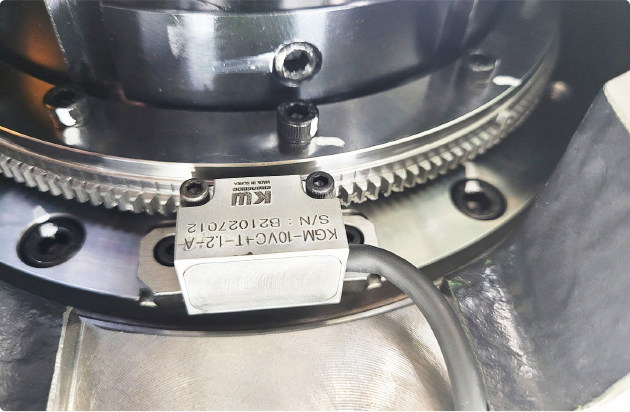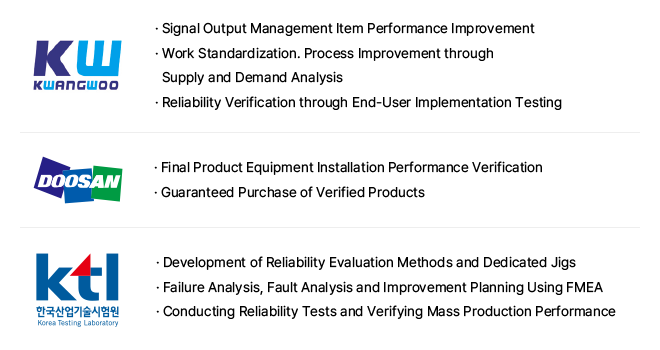NEWS

Kwangwoo Co., Ltd. Selected as an Outstanding Company in the [Production Performance Evaluation Support Project Best Practices]
Localization of Encoder Technology Dominated by Global Companies: Development of MR Position Sensor Module, Paving the Way for Overseas Expansion
Kwangwoo Co., Ltd. was founded in November 1992 with a clear goal to produce encoders for machine tools and light source products for inspection equipment. The company was driven by a strong belief in contributing to society by enhancing industrial competitiveness through localization.

Solid Expertise in Optical Encoder Manufacturing
Kwangwoo has been steadily advancing for nearly 30 years, securing a unique position in the encoder and light source fields. They have now made a significant leap with the development of a magnetoresistive (MR) position sensor module.

He emphasized that encoder sensor technology is essential for processing the diverse, complex, and precise movements required by modern machine tools, which previously only needed to perform simple, repetitive actions with mechanical systems.
Kwangwoo’s years of experience in optical encoder manufacturing have resulted in strong expertise. However, the contact-based structure using bearings frequently led to malfunctions during operation. Additionally, poor maintenance and low production yields highlighted the limitations of this approach. Optical components and disc substrates, which are critical for signal output, were vulnerable to contamination, leading to high defect rates in harsh environments.

Domestic companies found themselves in a difficult position, caught between the superior production capabilities and price competitiveness of Chinese products, and the overwhelming dominance of American, Japanese, and German companies. Many domestically developed products never reached commercialization due to lack of demand.
Finally, a significant opportunity arose for Kwangwoo. They proposed the development of a magnetoresistive (MR) position sensor module for the first time in Korea, and received support from Doosan Machine Tools, which expressed willingness to collaborate. Kwangwoo, feeling the limitations of its technological capabilities and the domestic market, dedicated itself anew to the development of the MR encoder.
Overcoming Barriers to Develop a Magnetoresistive Encoder
Director Jeon emphasized that the magnetoresistive encoder they aimed to develop differed from FANUC’s product. Although the performance was similar, the design and technology were distinct. They dedicated three years to research and experimentation, often working late into the night, driven by the determination to create a competitive domestic product for the global market.
Their hard work paid off in 2019 when Kwangwoo successfully developed a magnetoresistive encoder featuring a compact design, a maximum response frequency of 200KHz, and an IP68-rated fully sealed structure. This encoder converts voltage and current values generated by the magnetoresistive elements in response to magnetic field changes into analog electrical signals, which are used to detect the speed and position data of spindle motors. Unlike optical encoders, the non-contact structure of the magnetoresistive encoder reduces the likelihood of failure, making it easier to assemble and thus more productive.
Kwangwoo showcased a prototype to Doosan Machine Tools, supplying around 500 units for field testing over a year. Although a few defects were reported, mass production required further improvements in defect rates, as well as performance and reliability verification.
CEO Eo Wong-sun noted that despite some technical successes achieved through the efforts of the R&D team and the cooperation of Doosan Machine Tools, it was crucial to match the performance of advanced foreign products to complete the localization process. To this end, they participated in a mass production performance evaluation support project.
With support from Doosan Machine Tools, Kwangwoo worked on achieving a level of performance comparable to that of leading global manufacturers. The company formed a consortium with the Korea Testing Laboratory (KTL) to enhance production scalability. They developed reliability assessment standards, focusing on environmental and life cycle testing, including stress tests involving vibration and temperature to simulate operating conditions. Additionally, they conducted comparative output signal waveform evaluations with FANUC’s products to confirm performance.
Comparison Analysis Results
The output waveform of Kwangwoo’s product was found to simulate the level of Japan’s FANUC products closely. Furthermore, when installed on the manufacturing equipment of the demand company for performance evaluation, the data on the PA/PB phase gap adjustment and the effect on run-out were also similar.

Kwangwoo’s magnetoresistive encoder demonstrated a level of completion in some performance metrics that rivaled advanced companies. However, to meet the requirements of Doosan Machine Tools, further performance enhancements were necessary. As a result, Kwangwoo plans to verify performance through design improvements and then validate reliability in real-use environments to secure mass production capability.
CEO Eo Woong-sun, who stated, “Developing the magnetoresistive encoder over the past three years has been extremely challenging,” expressed confidence as they proceeded with the mass production performance evaluation. He conveyed that if performance is improved through mass production performance evaluation and if the production line operates stably, the product’s level will be second to none.
“No matter how determined a small business is, it hits limitations. Without the support of Doosan Machine Tools and the mass production performance evaluation support project, it would have been difficult to get this far. Localization of even small components is essential for securing the competitiveness of our country’s industry and companies.”
CEO Eo hinted that they aim to use the improvement and verification of mass production performance as a stepping stone to secure technology on par with advanced companies and to enter overseas markets. Since the magnetoresistive encoder is a key component essential for the miniaturization and precision of industries such as manufacturing equipment and intelligent robots, it is expected to bolster Kwangwoo’s future as it expands beyond the domestic market to the international stage.
 Rotary Encoder Incremental Type
Rotary Encoder Incremental Type Absolute Magnetic Encoder
Absolute Magnetic Encoder Pulse Generator
Pulse Generator Resolver
Resolver Laser Scan Sensor
Laser Scan Sensor Light Guide
Light Guide Light Source
Light Source Information display device
Information display device